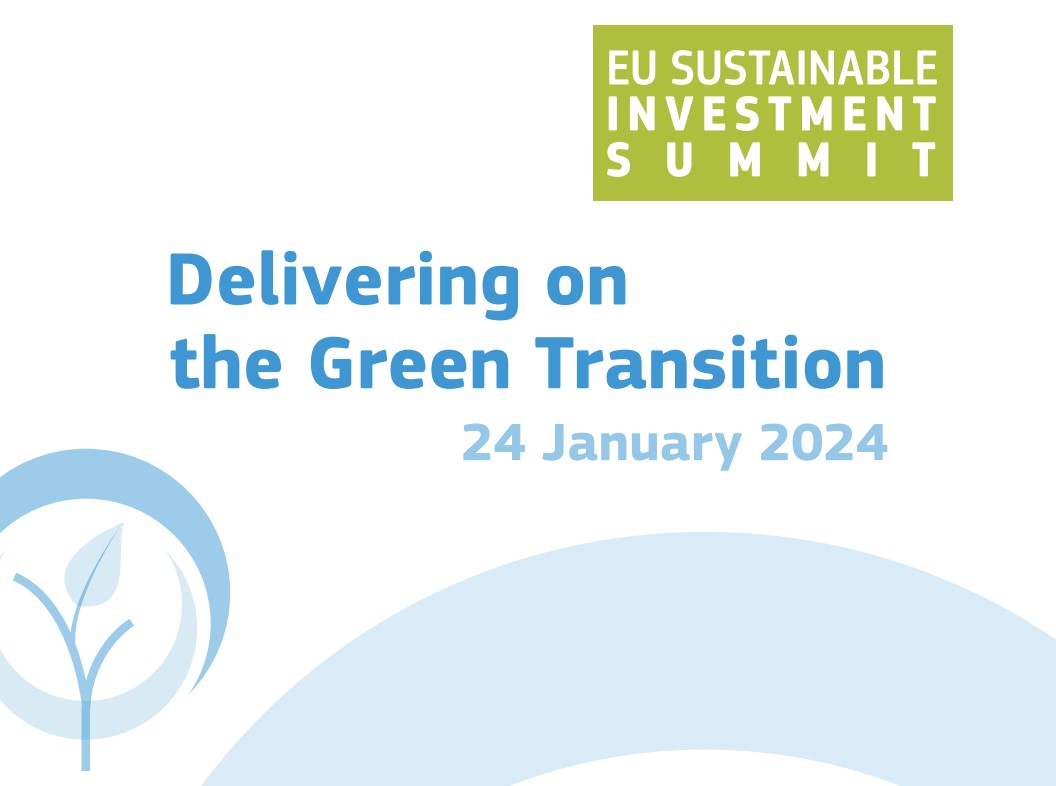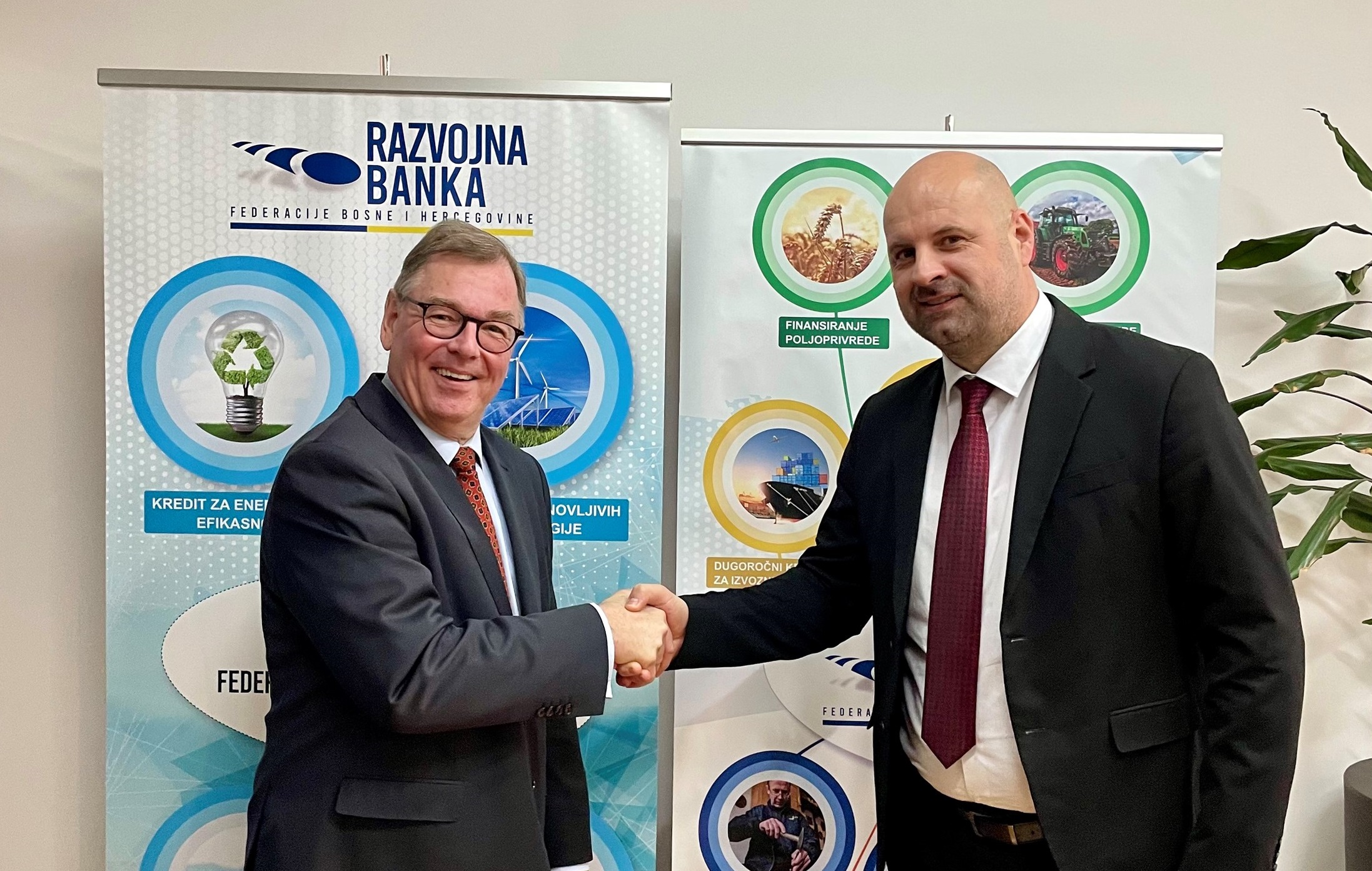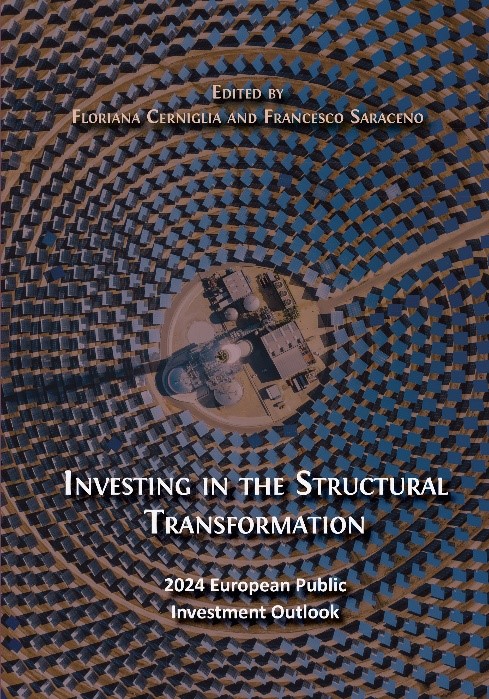Brussels, 20 January 2025
The 2024 edition of the European Public Investment Outlook (EPIO) was published in December 2024. It contains interesting positions about long-term investment. The authors include academia, banking economists or (ex-) politicians from Europe and beyond. Sophie Barbier (CDC) and ELTI Secretary General Helmut von Glasenapp contributed an article about “Financing Structural Investment after 2027” (Chapter 11).
📖Read more/Download it here PInvestingintheStructuralTransformation-The2024EuropeanPublicInvestmentOutlookDF
Brussels, 8 July 2024

The EU Sustainable Investment Summit 2024 brochure was recently released, an event which saw ELTI President Dario Scannapieco attending as a panelist last January.
The brochure features a brief summary of the panel, “Making it happen: towards a net-zero economy”, and particularly highlights the need to combine public and private, European and national resources to stimulate investments in green technologies. PTheEUSustainableInvestmentSummit2024DF
Brussels, 4 March 2024

Development Bank FBIH started negotiations for membership in another renowned European association: ELTI
The Association of European Long-Term Investors (ELTI) represents a broad European network of national promotional banks and institutions that offer financial solutions adapted to the specific needs of countries and their economies.
From August 2023, ELTI gathers 31 members from 21 member states of the European Union, as well as candidate countries, with the aim of promoting long-term investments in close connection with the goals and initiatives developed by the European Union, in order to encourage sustainable, smart and inclusive growth and job creation.
In this context, in the premises of the Development Bank of the Federation of Bosnia and Herzegovina, a meeting was held on the topic of potential membership of this bank in the ELTI Association, which was attended by Mr. Helmut von Glasenapp, General Secretary of ELTI, and Mr. Dalibor Milinković, Acting Executive Director for Projects and Development of the Development Bank FBIH .
Taking into account the status of Bosnia and Herzegovina as a candidate for membership in the European Union, joining ELTI Development Bank FBIH would have access to continuous exchange of information and experiences with other members, promotion of interests by ELTI and active participation in initiatives that support the harmonization of banking regulations with European standards. In addition, it would be enabled to be informed in a timely manner about all changes in EU policies that affect the banking sector, but also the possibility to initiate issues of importance for the bank and the sustainable economic development of BiH.
"I am pleased to point out that Development Bank FBIH has started negotiations for membership in another renowned European association - ELTI, with the aim of harmonizing its operations with the standards of the European Union. This meeting represents another important step in our effort to ensure compliance of our bank's operations and regulations with European practices and rules.
We also recently started negotiations for membership in the European Association of Public Banks (EAPB) and held a meeting with the Croatian Bank for Reconstruction and Development, a long-standing EAPB member that also actively participates in the work of the board of directors of both associations. Now we will carefully consider all aspects related to membership in ELTI.
Membership in these renowned associations gives us access to advice, good practices and experiences of countries that have already gone through the process of integration, connection with European institutions, which would contribute to higher quality operations of our bank aligned with European norms." said Dalibor Milinković, Acting Executive Director for Projects and Development at Development Bank FBIH.
Brussels, 12 June 2023
Confrontations Europe, Laurent Zylberberg: Entre Faux prétextes et vrais problèmes, les industries de défense et la lutte contre le changement climatique
In this article for Confrontations Europe, ELTI President Laurent Zylberberg shows that beyond the debates on the non-application of the European taxonomy on the defense sector, Europe must put in place a lasting and sustainable defense industry as well as provide adequate financing for their needs, both of which cannot be envisaged without long-term investors. (French & English versions available) PConfrontationsEurope,Laurent ZylberbergEntreFauxprétextesetvraisproblèmeslesindustriesdedéfenseetlaluttecontrelechangementclimatiqueDF PConfrontationsEurope,Laurent ZylberbergEntreFauxprétextesetvraisproblèmeslesindustriesdedéfenseetlaluttecontrelechangementclimatiqueDF
Brussels, 10 February 2023
"The Role of Public Development Banks & Institutions in the Implementation of the United Nations’ Agenda 2030: A Survey in Europe"
The 17 Sustainable Development Goals (SDGs or Goals) were introduced by the United Nations as a blueprint to achieve a better and more sustainable future for all. Financial systems play a key role in this transition by providing funding for economic activities and reorienting capital flows towards a more sustainable economy and many private sector players have been adopting the SDGs as a guide for their sustainability programmes. In this context, Public Development Banks and Institutions (PDBIs) - entities initiated by governments at regional, national and multinational level to proactively pursue public policy objectives – may have specific mandates to provide and/or help mobilise financial support for additional investments with social and environmental objectives that the market fails to finance. Therefore, these players are by their nature called to action and to contribute to the SDGs.
This paper offers a first attempt to track the sustainability performance of PDBIs in Europe where, for several reasons, we are witnessing an enhanced public intervention in the economy, and PDBIs’ contribution to the alignment of EU Member States to the SDGs. PDTheRoleofPublicDevelopmentBanks&InstitutionsintheImplementationoftheUnitedNations’Agenda2030:ASurveyinEuropeF
Brussels, 30 December 2022
"Long-term investment, the keystone of a low-carbon, sovereign and competitive Europe"
Bernard Attali, Michel Derdevet and Laurent Zylberberg published a report (in French) which seeks to answer various questions on Geopolitical instability, the energy crisis, and on uncontrolled inflation. These are some of the many challenges that the European Union will have to face over the upcoming decades. They will obviously require massive and constant financial efforts over several decades. Long-term investment is therefore at the very heart of the issues facing the European Union. This is why it is urgent to develop and implement a real long-term investment strategy based on three pillars: increasing financing volumes, the mobilization of private capital and the establishment of an improved strategic vision. PL’investissementdelong termeclédevoûted’uneEuropedécarbonée, souveraineetcompétitiveDF
Brussels, 26 January 2022
"Investing for the long term, a short-term emergency"
Bernard Attali and Laurent Zylberberg published this report which seeks to answer various questions including:
How can we invest for the long term in an increasingly uncertain environment, where signals are scrambled, chaotic and difficult to read? What can the logic of long-term investments be when recent history has turned the most rational economic calculations on their heads? How can we take into account all the effects of investment decisions when these effects are increasingly numerous and complex? Is it not the case that the high cost of investments for sustainable growth, which should have been made a long time ago, grows as those investments become increasingly necessary? Because the crisis requires an urgent response, to deal with the most critical situations, is it not becoming increasingly difficult to take into account the long term, whose effects are less immediate?
Although the research focuses on the situation in France, the work carried out in this research is intended to be broadened to encompass Europe as a whole for a study of greater depth and particularly within the European paradox: a group of highly interconnected economies where each economy of that group has strong individual features derived from history. PattalireportTF
Brussels, 6 December 2021
The European Commission published the ESIF Financial Instruments annual summaries for 2020. By the end of 2020, indicative ERDF and Cohesion Fund allocation for Financial Instruments (FIs) in the submitted programmes was EUR 22.4 billion or about 9% of the total ERDF and Cohesion Fund envelope for the 2014-2020 period. Looking at the different uptake of FIs among Member States in the 2014-2020 programming period, this cannot be explained solely by differences in the fields of intervention, the level of development or the size of allocations, as similar Member States have very different shares of FIs. Lessons learned from the Member States allocating more of their resources to FIs should be used to explore the potential for increased use of FIs in the 2021-2027 programming period. Psummary_data_fi_1420_2020.pdfTF
Brussels, 24 November 2021
Through the European Green Deal process, which began in December 2019, a great change was seen when it came to the EU Green Deal and with regards to the Circular Economy, especially within the industrial sectors. The Border Carbon Regulation, which will come into effect in the coming period, is important for the Turkish industries and for Turkey's export strategy. In this context, it comes to the fore that significant investments may be required for the European Green Deal and Circular Economy. Where Turkey is considered, it is of great importance to involve the private sector in adaptation investments, which cannot gain importance only by transferring public resources.
Having adopted sustainability and inclusion as its core business model, TSKB initially released its “European Green Deal and Circular Economy Theme Study” as part of its mission to implement Turkey's industrial transition with our stakeholders. While the economic and social effects of the risks stemming from climate change are starting to be seen clearly, the regulations taken towards decarbonization have come to the fore. Within this axis, which can be seen in this report, TSKB aims to examine the effects of the EU Green Consensus and the circular economy concept in Turkey. PTSKB-European_Green_Deal_and_Circular_Economy_Theme_Study.pdfDF
Brussels, 23 November 2021
The European Think Tanks Group (ETTG) published a study on Financing the 2030 Agenda: An SDG alignment framework for Public Development Banks. This study aims both to propose a definition of Sustainable Development Goals (SDGs) alignment and to provide concrete principles for public development banks (PDBs) to further operationalise and promote such alignment in practice. As such, it supplies a much deeper comprehension of the 2030 Agenda, arguing that alignment with the Paris Agreement and the SDGs must go hand in hand.PETTG-study-Financing-the-2030-Agenda-An-SDG-alignment-framework-for-Public-Development-Banks.pdfDF
There is also a second report which builds on the inaugural New Structural Economics Development Financing Research Report entitled “Mapping Development Finance Institutions Worldwide: Definitions, Rationales, and Varieties”, carried out by the Institute of New Structural Economics (INSE) at the Peking University in China. The objective of the present report is to refine the qualification criteria of PDBs and development financing institutions (DFIs) and propose potential typologies to reveal their vast diversities. PNSE_development_finance_research_report_no.2_Mapping500DBs_002.pdfDF
Brussels, 24 October 2023
STEP Proposal PSTEP ProposalDF
